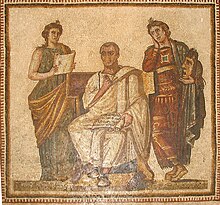
Back ثقافة إيطالية Arabic Cultura d'Itàlia Catalan Diwylliant yr Eidal CY Cultura de Italia Spanish فرهنگ در ایتالیا FA Italian kulttuuri Finnish Culture de l'Italie French Olaszország kultúrája Hungarian Cultura italiana Italian イタリア文化 Japanese
This article may be too long to read and navigate comfortably. (October 2024) |
| Part of a series on the |
| Culture of Italy |
|---|
 |
| People |
| Traditions |





The culture of Italy encompasses the knowledge, beliefs, arts, laws, and customs of the Italian peninsula and of the Italians throughout history. Italy has been the centre of the Roman civilization, the Catholic Church, and of the Renaissance, as well as the starting point of movements with a great international impact such as the Baroque, Neoclassicism, and Futurism and significantly contributed to historical phenomenons such as the Age of Discovery and the Scientific revolution.[1] Italy is considered a cultural superpower and the Italian peninsula one of the birthplaces of Western civilization.[2][3]
- ^ Cohen, I. Bernard (1965). "Reviewed work: The Scientific Renaissance, 1450-1630, Marie Boas". Isis. 56 (2): 240–42. doi:10.1086/349987. JSTOR 227945.
- ^ Marvin Perry, Myrna Chase, James Jacob, Margaret Jacob, Theodore H. Von Laue (1 January 2012). Western Civilization: Since 1400. Cengage Learning. p. XXIX. ISBN 978-1-111-83169-1.
- ^ Italy has been described as a "cultural superpower" by Arab news, the Washington Post, The Australian, the Italian consul general in San Francisco Archived 27 November 2015 at the Wayback Machine, the former Foreign Affairs Minister Giulio Terzi, and the U.S. President Barack Obama Archived 26 December 2014 at the Wayback Machine.